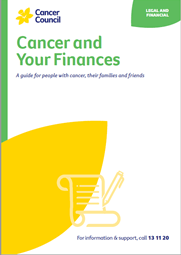Cancer and your finances
You may be worried about how to manage the financial impact of a cancer diagnosis and treatment. This information will help you understand the types of costs that can add up and find ways to deal with them.

Download PDF
Print these questions
Treatment costs
- How much will I have to pay for consultations?
- How much will I have to pay for imaging scans or other tests?
- Can you give me a written estimate of treatment costs?
- Are there other effective treatments that cost less?
- Who else will care for me and how can I find out what their fees will be?
- Are there any out-of-pocket costs not covered by Medicare or my private health cover?
- Will there be any up-front payments?
- Do you bulk-bill?
- Can I be treated as a public patient?
Health fund
- Am I covered for this surgery?
- Do I have to pay an excess or co-payment?
- Do you have a gap scheme?
- Is my hospital or doctor covered by your gap scheme?
Financial impacts of treatment
- Are the costs negotiable? Can the cost be reduced if I can’t afford it?
- When will I have to pay? Do you offer flexible repayment plans? Do you charge interest?
- Will I be able to work while having treatment?
Financial help
- What Centrelink benefits am I able to claim?
- Who can I talk to about my financial situation and available financial support?
- Am I eligible for patient travel assistance? How do I apply?
Need to talk?
Call 13 11 20 to talk to a health professional Or email us your questions.